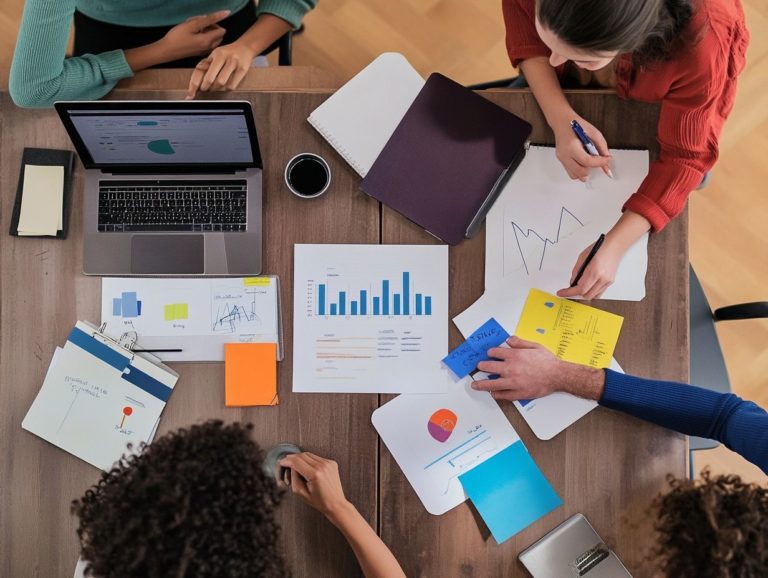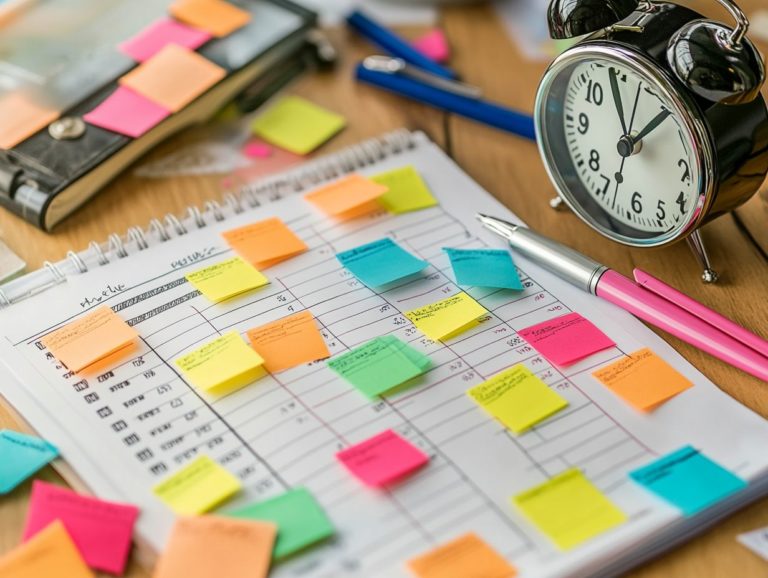what should i do if i get distracted while studying?
Studying effectively can often feel like an uphill battle, particularly when distractions seem to pop up at every turn.
With your phone buzzing with notifications, the siren call of social media, or the constant chatter from the next room, maintaining focus can be quite a challenge.
This article delves into the common distractions that can derail your study sessions, examining their impact on learning and retention, alongside practical tips for minimizing interruptions. Discover how to create a distraction-free environment and cultivate long-term habits that keep your focus sharp. Transform your study time into a more productive and enjoyable experience!
Contents
- Key Takeaways:
- Common Distractions While Studying
- Effects of Distractions on Studying
- Ways to Stay Focused While Studying
- Creating a Distraction-Free Study Environment
- Dealing with Distractions in the Moment
- Managing Distractions in the Long Term
- Frequently Asked Questions
- What should I do if I get distracted while studying?
- How can I prevent distractions while studying?
- What should I do if I’m too tired to focus on studying?
- Should I give in to distractions during study breaks?
- What should I do if I keep getting distracted by my thoughts?
- Can distractions actually be beneficial while studying?
Key Takeaways:

Identify and address distractions while studying to improve focus and productivity. Distractions can negatively impact learning and retention, so it is important to minimize them. Create a distraction-free study environment and develop habits to avoid distractions for long-term success.
Common Distractions While Studying
For many students, studying often feels like an uphill battle, particularly when distractions abound, threatening to derail their focus. Whether it s the chatter during lectures, the incessant buzz of social media notifications, or family interruptions at home, these distractions can disrupt even the most committed learners. Acknowledging these interruptions is the crucial first step in crafting an environment that inspires concentration and enhances productivity.
Ready to Conquer Distractions?
Identify and address distractions to develop effective study techniques that enable sustained focus and improved concentration during your study sessions. To effectively tackle distractions, you need to recognize both external factors, like noise and interruptions from technology, as well as internal challenges such as wandering thoughts or anxiety.
Create a dedicated study space to manage distractions. You might also consider incorporating mindfulness exercises, which help you stay present, to sharpen your internal focus.
Use the Pomodoro Technique to boost focus, encouraging you to engage in concentrated study periods followed by short breaks to stave off fatigue. Remember, motivation is crucial; setting clear, achievable goals will reinforce your sense of purpose, paving the way for a more focused and productive learning environment.
Effects of Distractions on Studying
Distractions greatly impact your studies, significantly diminishing both learning and retention. This can hinder your ability to effectively achieve your study goals.
Impact on Learning and Retention
The impact of distractions can lead to significant struggles, especially when procrastination looms large and effective time management feels elusive. These challenges often reveal themselves through lower grades, waning confidence, and an overwhelming sense of pressure. As you navigate an environment teeming with constant notifications and social media distractions, it becomes essential to cultivate a sharper focus and adopt structured schedules.
By prioritizing tasks and setting clear goals, you can greatly enhance your ability to concentrate, transforming potential distractions into manageable segments of your study routine. Ultimately, fostering better concentration not only boosts your knowledge retention but also gives you the power to pursue your academic aspirations with newfound ease.
Ways to Stay Focused While Studying

You have countless strategies at your disposal to maintain focus while studying, each vital for fostering a productive environment that nurtures effective learning and consistency in your study routine. Embracing these techniques can transform your study sessions into a seamless flow of engagement and understanding.
- Create a dedicated study space.
- Incorporate mindfulness exercises.
- Use the Pomodoro Technique.
- Set clear and achievable goals.
Take charge of your study time today!
Tips and Techniques for Minimizing Distractions
Implementing targeted tips and techniques to minimize distractions can significantly enhance your ability to focus on studying and optimize your productivity.
Creating an inspiring environment is key to setting the right mindset for effective study sessions. Personalize your study space with motivational quotes or visuals that resonate with your goals. This little change can make your space inspiring.
Crafting a study list organizes tasks and provides you with a clear framework to follow, making it easier to tackle each subject systematically.
Utilizing ‘do not disturb’ settings on your devices ensures that unnecessary notifications won t break your flow. By customizing strategies to align with your learning habits and preferences, you can create a study routine that truly works for you.
Creating a Distraction-Free Study Environment
Establishing a distraction-free study environment is essential for students seeking to enhance concentration and minimize interruptions.
This is your chance to create the perfect study nook to immerse yourself fully in your studies and tackle tasks with seamless focus.
Setting Up a Productive Study Space
Setting up a productive study space at home can greatly impact your study sessions and improve your academic performance.
Choose the right location be it a quiet corner or a dedicated desk area to draw a clear line between study time and personal life. Prioritize good lighting and comfortable furniture to foster an atmosphere that encourages concentration.
An academic coach is a person who helps you improve your study habits. They can provide personalized guidance, identifying your unique needs and suggesting tailored strategies to optimize your workspace.
Incorporating techniques such as organization, scheduled breaks, and minimizing clutter will empower your study efforts and help you achieve your academic goals.
Dealing with Distractions in the Moment
Navigating distractions requires effective strategies to regain focus while studying.
By employing these techniques, you can stay aligned with your academic goals and maximize productivity.
Strategies for Regaining Focus

Implementing strategies to regain focus during study sessions is crucial, especially when family distractions or unwanted background noise compete for your attention.
Creating a conducive study environment is key. Establish a dedicated space that minimizes interruptions away from high-traffic zones where you can concentrate without disruption.
Noise-canceling headphones can be a game-changer; they block distracting sounds and help you focus better. Talk to your family about your designated study times to create an atmosphere of respect and understanding that benefits everyone.
Don t underestimate the power of structured breaks! By stepping away to recharge periodically, you ll maintain your focus and productivity during intense study periods, making every minute count.
Managing Distractions in the Long Term
Managing distractions long-term requires cultivating habits that prevent interruptions and implementing effective planning and time management strategies.
By doing so, you set yourself up for sustained academic success.
Developing Habits to Avoid Distractions
Developing habits to ward off distractions is essential. Teaming up with an academic coach can help you align your study habits with your goals.
By creating a focused study routine, you establish a structured environment. This reduces interruptions and allows for deeper engagement with your material.
Using techniques like the Pomodoro Technique working in short bursts followed by brief breaks will keep your motivation high. An academic coach can offer personalized strategies to identify and address your unique distractions.
Incorporating mindfulness exercises enhances your ability to concentrate. This helps you manage stress and ultimately improve your academic performance.
Frequently Asked Questions
What should I do if I get distracted while studying?
If you find yourself getting distracted while studying, try these tips:
- Find a quiet and comfortable study space.
- Set a timer for focused study sessions.
- Take breaks between study sessions.
- Remove any potential distractions, such as your phone or TV.
- Study with a partner or group to stay accountable.
- Practice mindfulness techniques to refocus your mind.
How can I prevent distractions while studying?

To prevent distractions while studying, consider these strategies:
- Set specific study goals for each session.
- Organize your study materials beforehand.
- Minimize background noise or use headphones.
- Turn off notifications on your phone or put it on silent.
- Let your friends and family know you shouldn t be disturbed.
- Keep your study space clean and clutter-free.
What should I do if I’m too tired to focus on studying?
If you feel too tired to focus, try these tips:
- Take a short power nap to recharge your mind.
- Get some fresh air and take a brief walk.
- Drink water or have a healthy snack.
- Do a quick stretching session to increase blood flow.
- Listen to calming music or a study playlist.
- Switch to a different subject to stay engaged.
Should I give in to distractions during study breaks?
It’s important to take breaks, but use them effectively. Instead of giving in to distractions, try these activities:
- Review your notes or summarize what you ve learned.
- Do a quick review of flashcards or practice problems.
- Take a short walk or do light exercise.
- Meditate or practice deep breathing.
- Have a healthy snack or drink water.
- Call a friend or family member to chat briefly.
What should I do if I keep getting distracted by my thoughts?
If distracting thoughts pull you away from studying, try these techniques:
- Practice mindfulness, like deep breathing or body scans.
- Write down your distracting thoughts and set them aside.
- Break your study material into smaller, manageable chunks.
- Use study aids like highlighters or flashcards.
- Take a short break for a quick mental reset.
- Change your study location or routine.
Can distractions actually be beneficial while studying?
Believe it or not, some distractions can be beneficial. For example:
- Listening to calming background noise can improve focus.
- Chewing gum or having a snack can increase blood flow and help with concentration.
- Engaging in quick physical activity can boost alertness.
- Taking short breaks to daydream can enhance creativity and problem-solving skills.






